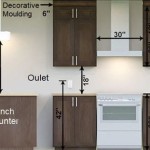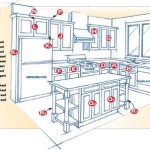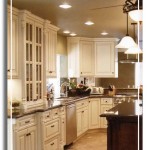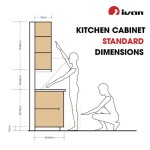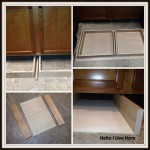How Thick Should Kitchen Cabinet Doors Be?
The thickness of kitchen cabinet doors is a crucial factor in their durability, aesthetics, and functionality. While there is no one-size-fits-all answer, understanding the different factors that influence door thickness can help you make an informed decision for your kitchen remodel. Choosing the right thickness ensures that your cabinets are not only visually appealing but also sturdy and long-lasting. This article will delve into the key considerations for determining the appropriate thickness for your kitchen cabinet doors.
Durability and Strength
The thickness of your cabinet doors directly impacts their durability and strength. Thicker doors are more resistant to warping, sagging, and damage from everyday use. They can withstand the weight of heavy items stored inside, preventing the doors from bowing or bending over time.
Generally, cabinet doors are made with a core material, such as plywood or particleboard, and a veneer or laminate finish. The thickness of the core is a significant factor in its sturdiness. A standard thickness for cabinet door cores is 3/4 inch (19 mm), but there are variations based on the material and construction method. For example, solid wood doors can be thicker and might be available in 1-inch (25 mm) thicknesses. The thickness of the veneer also plays a role, with thicker veneers adding to the overall durability.
Aesthetics and Style
Cabinet door thickness contributes to the overall aesthetic of your kitchen. Thicker doors tend to have a more robust and substantial look, while thinner doors can create a more modern and sleek appearance. The choice often depends on the style of your kitchen and your personal preferences.
For example, shaker-style cabinets, known for their clean lines and traditional appeal, often feature thicker doors. These doors contribute to a more solid and timeless look. In contrast, contemporary kitchens might opt for thinner doors, which can create a minimalist and streamlined aesthetic.
It's crucial to also consider the size and scale of your kitchen. In a small kitchen, thicker doors might overwhelm the space, while thinner doors can create a more open and airy feel. Ultimately, the choice of door thickness should complement the overall style and design of your kitchen.
Functionality and Ease of Use
The thickness of your cabinet doors can impact their functionality and ease of use. Thicker doors can feel more substantial and provide a sense of quality. However, they also have a slightly heavier weight, which might make them slightly harder to open and close, especially in large cabinets.
Thinner doors, on the other hand, are lighter and can be easier to operate. They are also more suitable for smaller cabinets or spaces where weight is a concern. Additionally, thinner doors can help minimize the visual impact of the cabinet frame, making them ideal for minimalist or modern kitchens.
Ultimately, the choice of door thickness depends on your personal preferences and the specific needs of your kitchen. It's important to consider factors like cabinet size, storage requirements, and the desired aesthetic to make the most informed decision.

Kitchen Quality Checks Compare

18mm 21mm Thickness Pvc Kitchen Cabinet Doors China Door Made In Com

Most Popular Kitchen Cabinet Door Style Top Choice For Homeowners

Slim Shaker Cabinets Are Not A Trend Superior

18mm 21mm Thickness Pvc Kitchen Cabinet Doors China Door Made In Com

Why You Should Choose Us Over A Local Cabinet Maker Retreat Design

Osb Kitchen Cabinet Doors Bunnings Work Community

Osb Kitchen Cabinet Doors Bunnings Work Community

18mm 21mm Thickness Pvc Kitchen Cabinet Doors China Door Made In Com

Hinged Upvc Cabinet Door For Office Thickness 10mm
Related Posts

